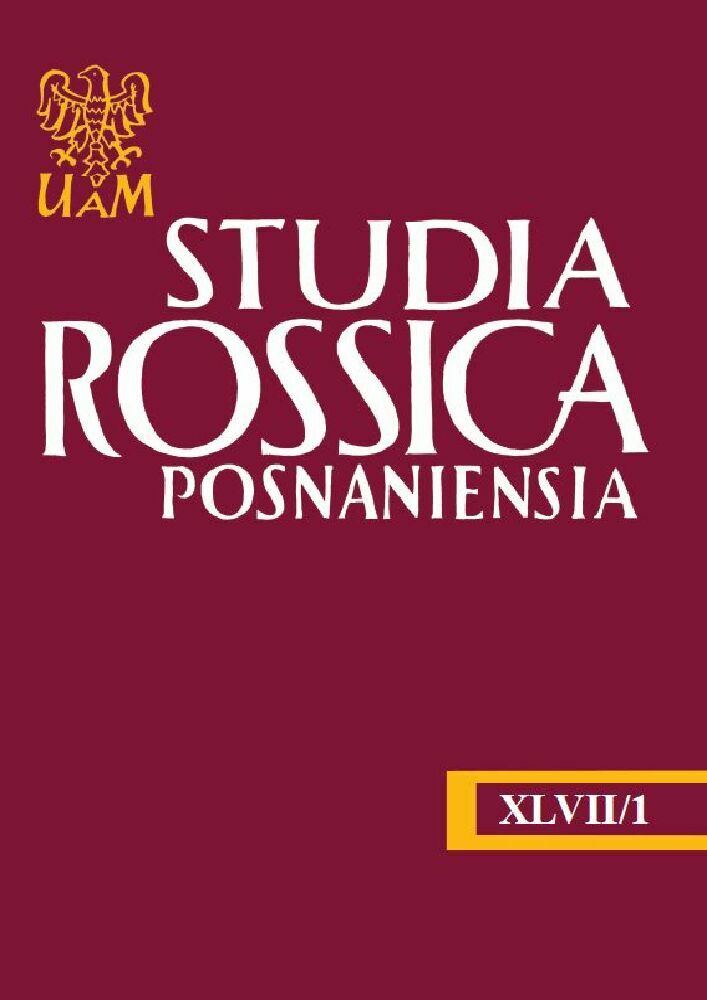Abstrakt
The article is devoted to the characteristics of Russian-language internet memes that use or allude to the character of Stierlitz, the legendary intelligence agent created by the writer Yulian Semyonov and adapted for the screen in the TV series Seventeen moments of spring, directed by Tatyana Lioznova. The analysis focuses not only on the memes directly referring to the series and jokes about Stierlitz, but also on examples using associations related to the character and the film (in the textual and/or iconic layer) to humorously illustrate phenomena occurring in contemporary Russia. The first group of memes can be seen as the continuation of the Stierlitz jokes still popular in Russia, while the second group includes memes whose main characters are contemporary Russian political activists and politicians (e.g. Vladimir Putin and Alexei Navalny), as well as those referring to current events in the country and the world (e.g. the coronavirus pandemic and the introduction of the Russian vaccine). In both cases, punchlines from jokes or precedent statements combined with an iconic layer are used to create comic effects.
Bibliografia
Âgodkina, Marʹâna. „Memy v internet-kommunikacii”. Art Logos, 2 (7), 2019, s. 142–151.
Belousov, Aleksandr. „Anekdoty o Štirlice”. Živaâ starina, 1, 1995, s. 16–18.
Buttler, Danuta. Polski dowcip językowy. Warszawa, Polskie Wydawnictwo Naukowe, 1968.
Dawkins, Richard. The selfish gene. Oxford, Oxford University Press, 1976.
Gumowska, Anna. „Mem – nowa forma gatunkowo-komunikacyjna w sieci”. Teksty Drugie, 3, 2015, s. 213–235.
Kanašina, Svetlana. „Internet-mem i precedentnyj fenomen”. Vestnik Tomskogo gosudarstvennogo pedagogičeskogo universiteta, 4 (193), 2018a, s. 122–127.
Kanašina, Svetlana. „Internet-mem kak mediatekst”. Izvestiâ Saratovskogo universiteta. Novaâ seriâ. Seriâ Filologiâ. Žurnalistika, 19 (1), 2019, s. 107–112.
Kanašina, Svetlana. „Internet-mem kak polimodalʹnaâ edinica internet-kommunikacii”. Kognitivnye issledovaniâ âzyka, 35, 2018b, s. 116–121.
Kolokolʹceva, Tatʹâna, Olʹga Lutovinova, red. Internet-kommunikaciâ kak novaâ rečevaâ formaciâ. Moskva, Izdatelʹstvo Flinta, Nauka, 2018.
Kołowiecki, Wiktor. „Memy internetowe jako nowy język internetu”. Kultura i Historia, 21, 2012. Web. 04.08.2021. www.kulturaihistoria.umcs.lublin.pl/pl/archives/3637.
Kovšova, Mariâ, Dmitrij Gudkov. Slovarʹ lingvokulʹturologičeskih terminov. Moskva, Gnozis, 2018.
Krongauz, Maksim. Samoučitelʹ Olbanskogo. Moskva, Izdatelʹstvo AST, 2013.
Kvât, Aleksandra. „Mediamem kak instrument političeskogo PR: kognitivnyj podhod”. Mediaskop, 1, 2013. Web. 25.07.2021. www.mediascope.ru/node/1254.
Lipps, Theodor. Komik und Humor: Eine Psychologisch-Ästhetische Untersuchung. Web. 10.08.2021. www.gutenberg.org/cache/epub/8298/pg8298.html.
Lysenko, Elizaveta. „Internet-memy v kommunikacii molodeži”. Vestnik Sankt-Peterburgskogo gosudarstvennogo universiteta. Sociologiâ, 10, 2017, s. 410–424.
Ozga, Krzysztof. „Demotywatory jako deprecjonujące akty intersemiotyczne”. Idea i komunikacja w języku i kulturze rosyjskiej. Red. Andrzej Dudek. Kraków, Wydawnictwo Uniwersytetu Jagiellońskiego, 2010, s. 259–266.
Sannikov, Vladimir. Russkij âzyk v zerkale âzykovoj igry. Moskva, Âzyki russkoj kulʹtury, 1999.
Sieńko, Marcin. „Demotywatory. Graficzne makra w komunikacji i kulturze”. Komunikowanie (się) w mediach elektronicznych. Język, edukacja, semiotyka. Red. Mirosław Filiciak, Grzegorz Ptaszek. Warszawa, Wydawnictwa Akademickie i Profesjonalne, 2009, s. 127–145.
Sladkevič, Žanna. „Mediaobraz San-Èskobara v prostranstve vymyšlennyh mirov: sociosemiotičeskij rakurs”. Slovo.ru: baltijskij akcent, 10 (2), 2019, s. 73–103.
Šmelëva, Elena, Aleksej Šmelëv. Russkij anekdot. Tekst i rečevoj žanr. Moskva, Âzyki slavânskoj kulʹtury, 2002.
Ŝurina, Ûliâ. „Internet-memy kak fenomen internet-kommunikacii”. Naučnyj dialog. Filologiâ, 3, 2012, s. 160–172.
Ŝurina, Ûliâ. „Internet-memy: problema tipologii”. Vestnik Čerepoveckogo gosudarstvennogo universiteta, 6 (59), 2014a, s. 85–89.
Ŝurina, Ûliâ. „Internet-memy v strukture komičeskih rečevyh žanrov”. Žanry reči, 1–2 (9–10), 2014b, s. 147–153.
Śliź, Agnieszka. „Demotywator – emblemat kultury uczestnictwa? (Wokół problemów definicyjnych memów oraz memów internetowych)”. Zagadnienia Rodzajów Literackich, LVII, 1, s. 151–165.
Trendowicz, Marcin. Fenomen Štirlica. Obraz sovetskogo razvedčika v russkom âzyke i kulʹture sovremennoj Rossii. Gdańsk, Wydawnictwo Uniwersytetu Gdańskiego, 2019.
Licencja
PRACE PUBLIKOWANE W CZASOPIŚMIE DOSTĘPNE SĄ NA LICENCJI CREATIVE COMMONS:
Uznanie autorstwa-Użycie niekomercyjne-Na tych samych warunkach 4.0 Międzynarodowe.
Autorzy tekstów przyjętych do publikacji w czasopiśmie „Studia Rossica Posnaniensia” są zobowiązani do wypełnienia, podpisania i odesłania na adres redakcji umowy o udzielenie nieodpłatnej licencji do utworów, z zobowiązaniem do udzielania sublicencji Creative Commons.
Zgodnie z umową, autorzy tekstów opublikowanych w czasopiśmie “Studia Rossica Posnaniensia” udzielają Uniwersytetowi im. Adama Mickiewicza w Poznaniu niewyłącznej i nieodpłatnej licencji oraz zezwalają na użycie sublicencji Attribution-NonCommercial-ShareAlike 4.0 International (CC BY-NC-SA 4.0).
Autorzy zachowują prawa do dalszego, swobodnego rozporządzania utworem.
Autorzy, którzy wykorzystują w swoim tekście cudze utwory (np. ilustracje, fotografie) proszeni są o dostarczenie do redakcji czasopisma zgody na publikację.
Użytkownicy internetu uprawnieni są do korzystania z utworów opublikowanych po 2015 roku “Studia Rossica Posnaniensia” tylko w celach niekomercyjnych, pod następującymi warunkami:
https://creativecommons.org/licenses/by-nc-sa/4.0/
Uniwersytet im. Adama Mickiewicza w Poznaniu zachowuje prawo do czasopisma jako całości (układ, forma graficzna, tytuł, projekt okładki, logo itp.).

